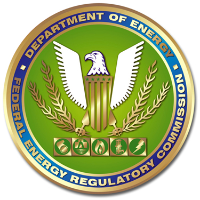The Federal Energy Regulatory Commission (FERC) was formed in 1977. The top priorities of FERC include:
· Promotes reliable, efficient, and sustainable energy for consumers;
- Ensures just and reasonable rates, terms, and conditions;
- Promotes safe, reliable, secure, and efficient infrastructure; and
- Enforces compliance with FERC rules and federal law by detecting and deterring energy market manipulation.
- Regulates the transmission and wholesale sales of electricity in interstate commerce;
- Reviews certain mergers and acquisitions and corporate transactions by electricity companies;
- Regulates the transmission and sale of natural gas for resale in interstate commerce;
- Regulates the transportation of oil by pipeline in interstate commerce;
- Approves the siting and abandonment of interstate natural gas pipelines and storage facilities;
- Reviews the siting application for electric transmission projects under limited circumstances;
- Ensures the safe operation and reliability of proposed and operating LNG terminals;
- Licenses and inspects private, municipal, and state hydroelectric projects;
- Protects the reliability of the high voltage interstate transmission system through mandatory reliability standards;
- Monitors and investigates energy markets;
- Enforces FERC regulatory requirements through imposition of civil penalties and other means;
- Oversees environmental matters related to natural gas and hydroelectricity projects and other matters; and
- Administers accounting and financial reporting regulations and conduct of regulated companies. (Wikipedia)
FERC has special pricing requirements with respect to "fast start" power generation sources such as coal, oil and natural gas plants that can respond to sudden spikes in energy demand. Such spikes are often caused by the variability of solar and wind power sources that do not match the variation in energy demand. Experts say that because of the fact that nuclear energy is not included in this special pricing, it cannot compete commercially with current fast start sources. They claim that this means that nuclear power is undervalued.
Half the U.S. fleet of around one hundred reactors are boiling water reactors that can practice load following which means varying their output to follow demand. While they can change their output, it is not particularly relevant to the cost of operating the plant. It costs about the same to run at full capacity as it does to run at half capacity.
Currently, the undervaluation of nuclear power production results in a serious disadvantage in the marketplace. Within the past two years, six states have shut down nuclear power plants because of economic issues. It is estimated that almost half the power reactors in the U.S. are in danger of being closed because they cannot compete.
New regulations are being considered at FERC to take into account the ability of boiling water reactors to quickly ramp up their electricity production but critics say that there are other important price related issues that are not being addressed. It is estimated that the average nuclear power plant must spend twenty two million dollars every year to comply with government regulation. This is a much greater compliance cost that other sources of electricity. However, nuclear power plants are much more complex and dangerous that other forms of power generation. Getting regulatory approval to construct a new nuclear power plant in the U.S. can take up to twenty five years.
Critics of current policies point out that competing with other power sources that receive special subsidies such as wind and solar power put nuclear power reactors at a distinct disadvantage in the power marketplace. While this may be true, on the other hand, these other power sources release less carbon dioxide into the atmosphere than nuclear power. They also do not generate dangerous nuclear waste and they do not pose the same threat to the environment and human health.
There is concern at FERC that widespread use of wind and solar power in the U.S. could make the U.S. grid unreliable. If coal, oil or natural gas have to be used to make up shortfalls of electricity due to demand spikes, then a great deal of unwanted carbon dioxide will enter the atmosphere. On the other hand, advances in massive batteries and other types of energy storage devices could help level out the energy supply in case of demand spikes. I find the arguments for new FERC regulations to help nuclear power reactors compete in the marketplace to be unconvincing.
